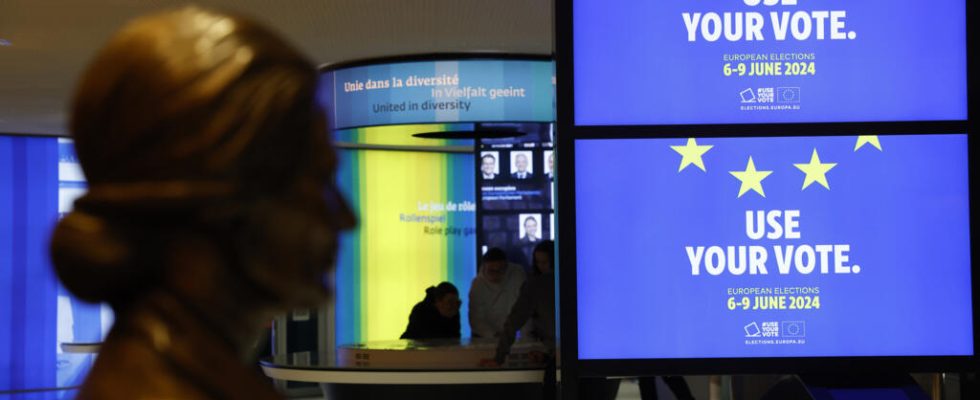On June 9, the French are called to elect their European deputies in a direct universal suffrage in one round. The campaign, which is not yet exciting, will logically accelerate in the coming weeks. And for the moment, polls predict a strong push by the nationalists.
4 mins
And the France is no exception where, as in nine other countries of the European Union, a far-right party is announced as the winner. In this case, it is the National Rally (RN), estimated at around 30% of voting intentions in the various surveys. It would be a huge score if he were to be confirmed at the polls because the party of Marine Le Pen and Jordan Bardella – the head of the list – won the last two European elections with 25% of the votes at most.
In addition to the RN on the far right of the political spectrum in France, we must also add Reconquête, the party of Éric Zemmour, to which polls give between 5 and 6% of the votes. The campaign of the Les Républicains party – certainly less Europhobic – revolves a lot around questions of immigration and the themes of roots and identity. His list, led by François-Xavier Bellamy, is credited with 7% of voting intentions.
Placed end to end and with certain precautions, this block weighs almost 40%. Something to worry the president’s camp Emmanuel Macron. Resolutely pro-European, the Head of State judges this election “ major “. In his camp, we even talk about elections “ historical “. The list of his Renaissance party, led by Valérie Hayer, would obtain between 21% and 16.5% according to the various polls. This list clearly seems to suffer from the unpopularity of the president, which explains, in part, the very clear push of the National Rally but also the list of the Socialist Party (PS) and Place publique (PP) carried by Raphaël Glucksmann. Leader on the left, she obtained up to 13% of voting intentions.
This list has the advantage of attracting those disappointed withEmmanuel Macron after the immigration law and the pension reform, as well as voters of Jean-Luc Mélenchon (La France Insoumise) in the 2022 presidential election. Some are unhappy with the positions of his movement which they consider ambiguous on theUkraine or even the Middle East.
“If there is a 10% difference, it will be a humiliation”
As during the last presidential election, victory should therefore be played out between the presidential camp and the party of Marine Le Pen and Jordan Bardella. For the moment, the advantage is with the RN. The Macronists are falling far behind and are worried behind the scenes. “If there is a 10% difference between the two lists on June 9, it will be a humiliation,” said a Renaissance deputy in particular, calling for a refocusing of the campaign.
At the beginning of April, the majority’s strategy was defeated. Until then, it consisted of making Ukraine the main theme of the campaign in the hope that this would highlight the controversial links between the RN and Vladimir Putin’s Russia. This, it seems, did not work. The burning news has been there such as the farmers’ crisis and the budgetary slippage. Two subjects unfavorable to the power in place and which, almost by principle, benefits the opposition.
In the presidential majority, we are therefore considering moving up a gear this month of April with the very probable entry into the campaign of Emmanuel Macron himself. A speech on his vision of Europe is planned for the last weeks of the month, possibly at the Sorbonne. Furthermore, a rumor is growing but it is far from being materialized at this time: the arrival of the president during a Valérie Hayer meeting.
The majority’s plan consists of talking about Europe while the RN tries to make the European elections a national election. Given France’s electoral past, the far-right party would be wrong to do differently. Certainly, the European elections are used to elect MEPs but voters take advantage of the stakes of the ballot, low in their eyes, to sanction more than to elect.
Debates and meetings
The polls, a snapshot of opinion at a given moment, can nevertheless evolve, especially since the programs of the lists, themselves not all completed, are not yet known. The French are also slow to become passionate about the countryside. Only half of them are sure to vote on Sunday June 9.
This week also marks the start of a new phase with an important media event on Wednesday evening: a debate between seven heads of lists and a representative of the RN (Number 1 Jordan Bardella leaves his place to number 3 Fabrice Leggeri) on RFI and France 24. There will also be numerous televised face-to-face meetings (at least one per week until the vote). Meetings likely to set everyone’s watches at election time. Without forgetting the meetings: several are planned for the coming weeks.
